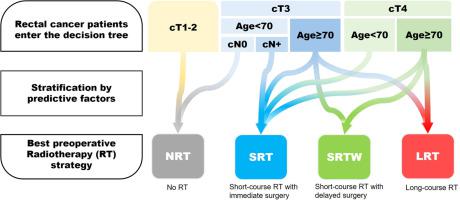Clinical Colorectal Cancer ( IF 3.4 ) Pub Date : 2023-05-14 , DOI: 10.1016/j.clcc.2023.04.001 Bin Luo 1 , Chuanwen Fan 2 , Xuqin Xie 3 , Per Loftås 4 , Xiao-Feng Sun 3

|
Background
There are 3 widely used preoperative radiotherapy (RT) procedures in rectal cancer treatment including long-course RT (LRT), short-course RT with delayed surgery (SRTW), and short-course RT with immediate surgery (SRT). However, further evidence is required to determine which treatment option results in more optimal patient survival.
Methods
This Swedish Colorectal Cancer Registry-based retrospective study of real-world data included 7766 stage I–III rectal cancer patients, of which 2982, 1089, 763, and 2932 patients received no RT (NRT), LRT, SRTW, and SRT, respectively. The Kaplan-Meier survival curve and Cox proportional hazard multivariate model were used to identify potential risk factors and to examine the independent association of RT with patient survival after adjusting for baseline confounding factors.
Results
RT effects on survival differed by age and clinical T stage (cT) subgroups. Subsequent survival analysis by age and cT subgroups confirmed that patients ≥70 years old with cT4 benefited from any RT (P < .001, NRT as reference) and equally from any RT (P > .05 pairwise between RTs). In contrast, for cT3 patients ≥70 years, SRT and LRT were associated with better survival than SRTW (P < .001). In patients <70 years, LRT and SRTW had superior survival benefits in cT4 patients but inferior to SRT (P < .001); SRT was the only effective treatment in the cT3N+ subgroup (P = .032); patients with cT3N0 and <70 years did not benefit from any RT.
Conclusion
This study suggests that preoperative RT strategies may have varying effects on the survival of rectal cancer patients, depending on their age and clinical stage.
中文翻译:

直肠癌患者的术前放疗决策树:基于瑞典结直肠癌登记处的真实世界分析
背景
直肠癌治疗中有 3 种广泛使用的术前放疗 (RT) 程序,包括长程放疗 (LRT)、短程放疗加延迟手术 (SRTW) 和短程放疗加立即手术 (SRT)。然而,需要进一步的证据来确定哪种治疗方案可以带来更佳的患者生存率。
方法
这项基于瑞典结直肠癌登记的真实世界数据回顾性研究包括 7766 名 I-III 期直肠癌患者,其中分别有 2982 名、1089 名、763 名和 2932 名患者未接受 RT (NRT)、LRT、SRTW 和 SRT 。Kaplan-Meier 生存曲线和 Cox 比例风险多变量模型用于识别潜在危险因素,并在调整基线混杂因素后检查 RT 与患者生存的独立关联。
结果
放疗对生存的影响因年龄和临床 T 分期 (cT) 亚组而异。随后按年龄和 cT 亚组进行的生存分析证实,≥70 岁的 cT4 患者受益于任何 RT(P < .001,NRT 作为参考),并且同样受益于任何 RT(RT 之间P > .05 成对)。相反,对于≥70岁的cT3患者,SRT和LRT比SRTW具有更好的生存率(P <.001)。对于 70 岁以下的患者,LRT 和 SRTW 在 cT4 患者中具有优越的生存获益,但不如 SRT ( P < .001);SRT 是 cT3N+ 亚组中唯一有效的治疗方法 ( P = .032);cT3N0 且 <70 岁的患者未从任何 RT 中受益。
结论
这项研究表明,术前放疗策略可能对直肠癌患者的生存产生不同的影响,具体取决于患者的年龄和临床分期。



























 京公网安备 11010802027423号
京公网安备 11010802027423号